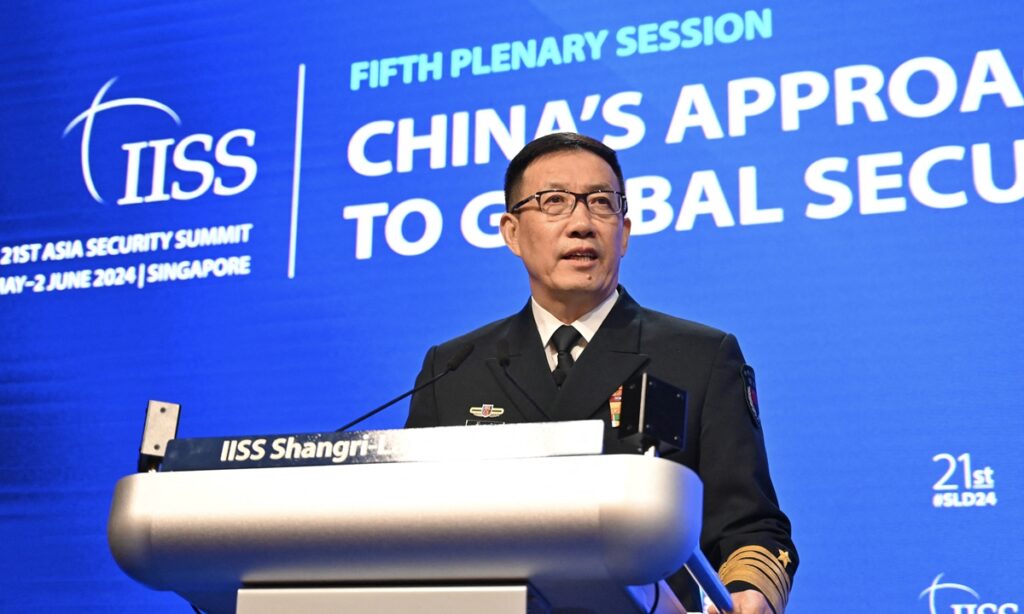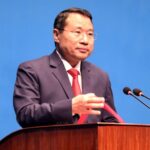Through this speech, the message conveyed by Minister Dong to the outside world can be summarized in one core word: “peace.” In the more than 500-word speech information released by the Ministry of National Defense, there are references to “peace,” “harmony” and “peace is precious.” This is China’s long-standing position and also a response to people living in the Asia-Pacific region who pursue harmony and love peace. To make a comparison, in the speech given by US Defense Secretary Lloyd Austin the day before, “deterrence”, “fighting” and “exercises” can be seen everywhere. Austin also flexed his muscles by saying, “The U.S. military remains the most capable fighting force on Earth” and “the Indo-Pacific has remained our priority theater of operations.” What feelings did the speeches of the Chinese and American defense chiefs, one calling for peace while the other calling for war, bring to other countries in the region?
Dong raised “three not allow” in his speech. He said, “We will not allow hegemony and power politics to harm the Asia-Pacific. Nor will we allow geopolitical conflicts, cold wars, or hot wars to be introduced into the Asia-Pacific. Nor will we allow any country or any force to create war and chaos here.” Although he didn’t single out a particular country, the countries in the region know well who is pursuing hegemonism and power politics in the region, and who is inviting wolves into the house attempting to cause war and chaos in the region. It is worth mentioning that the subject of the three “not allow” is “we,” not just China, but the people of the Asia-Pacific who are “committed to pursuing harmony, are peace-loving, independent, self-reliant, and have always supported each other through thick and thin.”
Dong also proposed six-point suggestions, including protecting the legitimate security interests of all countries, jointly building a more just and equitable international order, giving full play to regional security architecture, advancing open and substantive defense cooperation, setting an example of maritime security cooperation, and strengthening security governance in emerging areas to strive for new progress in regional security cooperation. These suggestions are realistic and feasible, and particularly emphasize China’s willingness to actively promote the implementation of the suggestions. We will not show off our force, nor will we form cliques. China has always been open-minded, focused on mutual benefit and pursued common progress.
One notable detail was when Minister Dong was interrupted by the host while talking about the Taiwan question in response to a question. Minister Dong emphasized that the Taiwan question is the core issue of China’s core interests and he must finish answering this question first. Why does China insist on finishing and clarifying this question? It is because Taiwan is a part of China, and safeguarding national sovereignty and territorial integrity is the sacred mission of the Chinese military. External forces are seeking to “use Taiwan to contain China” and divide China, leading Taiwan into a dangerous situation of war and chaos. In response, the Chinese People’s Liberation Army must clearly state its position, be prepared, and take decisive action to defend the reunification of the motherland. Since some countries repeatedly try to confuse the international community, the Chinese military must respond to them in the clearest and most understandable language, drawing clear red lines.
The current overall situation in the Asia-Pacific region is relatively stable, but not completely peaceful. The situations in the Taiwan Straits and the South China Sea are worrying. Just before and after this year’s Shangri-La Dialogue, it was revealed that Philippine Coast Guard patrol ships have been stationed within the lagoon of Xianbin Jiao (also known as Sabina Shoal), and Philippine personnel on a grounded Philippine military vessel pointed guns at a China Coast Guard team patrolling in the waters off Ren’ai Jiao. Some high-level officials from certain countries at the Dialogue kept mentioning “rules,” “deterrence,” and “allies.” There are two security concepts in the Asia-Pacific region now: One is regional common security achieved through dialogue and negotiation to resolve differences, and the other is so-called collective security achieved through forming alliances, expanding military forces, and preparing for war to “deter” other countries. Most countries in the region see this very clearly. Former Malaysian prime minister Mahathir Mohamad pointed out that “there is this belief in the West that to have peace, prepare for war, but that is wrong. Preparing for war ensures war,” exposing the fallacy of “peace through deterrence.” Indonesian Defense Minister Prabowo Subianto stated that a close neighbor is better than a distant relative, indicating that true security comes from good relations with neighboring countries. These insights drawn from the values of the Asia-Pacific region have resonated with countries in the region.
Why do countries in the region detest taking sides? Because taking sides does not serve the interests of the region, and also because China has always been a member of the region that pursues peaceful development. China is not only a proactive advocate for peace in the Asia-Pacific region, but also a guardian who matches its words with deeds. This makes countries in the region believe that China is a fellow traveler in safeguarding long-term stability and common prosperity in the Asia-Pacific region and the world.




